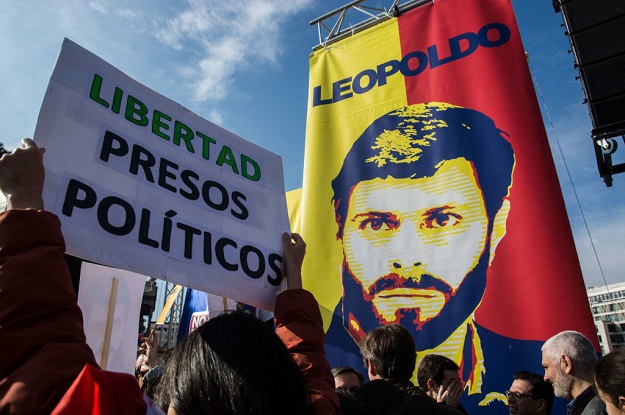My brother Leopoldo López, leader of Venezuela’s Voluntad Popular party, was sentenced to 13 years, nine months, seven days and 12 hours in prison for giving a speech in which he denounced the corruption and the antidemocratic repression of Nicolás Maduro’s government. He was arrested in 2014 during a government crack-down on protesters, and charged with inciting violence – false charges based on false evidence. Months after the sentence, the accusing attorney, Franklin Nieves, confessed that he was pressured by government officials to convict Leopoldo and four students without proof or testimony.
Subjected to detention in the military prison of Ramo Verde since Feb. 18th, 2014, he was mistreated, tortured and isolated in solitary confinement. In this prison within a prison, he suffered abominable medieval conditions, and was allowed few visits from his family and his lawyers, who were not able to see him for three months.
This week, Leopoldo was released into home arrest. The Supreme Court, controlled by Maduro, let him go on humanitarian grounds, with a short statement that mentioned his health problems. This is a victory for those who have been pushing for reform in the streets for more than 100 days now. It is also great news for his family – he will not suffer any more, and will be able to live with his wife and children.
Leopoldo had become Venezuela’s best-known political prisoner. In 2015, he was declared a prisoner of conscience by Amnesty International and his case had become an example of the actions of a dictatorship. Perhaps letting him go home was an attempt by the Maduro government to convince the world that critics like Leopoldo are unreasonable.
But he is not free – he is merely under house arrest. Letting Leopoldo go home does not mean conditions are improving in Venezuela. In fact, things are worse than ever.
Since 2014, when he was arrested, the intensity of repression and the number of political prisoners in Venezuela has increased. There were then 117 political prisoners in Venezuela. Now there are more than 400, according to data from the NGO Foro Penal Venezolano.
Not only political actors, like my brother, suffer prison and torture and are subject to illegal hearings: any person that expresses dissidence can be detained. This can happen while participating in peaceful protests or political meetings or just for expressing themselves publicly, including through social networks like Twitter. Many are students or political officials, including mayors, representatives, and city council members, but there are also stay-at-home moms, business owners, teachers, police officers, soldiers, lawyers, human rights activists, and journalists.
Among those being held are Representative Gilber Caro, whose parliamentary immunity was violated when he was detained and tried in military tribunals. The same applied for mayors Antonio Ledezma and Daniel Ceballos, who were persecuted for their opposition. Ledesma has been in house arrest for two years; Ceballos was under house arrest for one year before being locked up again. Young political leaders Yon Goicochea and José Vicente Garcia have also been detained for almost a year in the Helicoide (headquarters for the political police of the regime, SEBIN) despite having been declared innocent by civilian courts and possessing paperwork for their release.
Of Venezuela’s more than 400 prisoners, 28 are women. One emblematic case is that of Lisbeth Añez, a human rights activist who, starting in 2014, visited students detained by the regime, bringing them food and medicine. Lisbeth was detained at the Caracas international airport as she was departing for a trip. For more than a month, the administrator and human rights activist has been detained in the Helicoide, a site known for the cruel treatment of its detainees and the infernal overcrowding to which political prisoners are subjected.
In the long list of political prisoners, there are university professors and teachers: Jorge Machado, philosophy professor in the Universidad Central de Venezuela; Sergio Contreras of the Universidad Católica Andrés Bello; Santiago Guevara of the Universidad de Carabobo and Yoel Bellorín of the Universidad de Oriente; and Betty Grossi and Stecy Escalona, teachers by profession. Braulio Jatar, as well as other journalists, are under house arrest for exercising their right to inform.
A few months ago, Representative Rosmit Mantilla, who was imprisoned for two and a half years in the Helicoide (2014-2016) described the sleepless nights spent in that detention center. He could hear prisoners being “raped, disappeared, beaten, electrocuted; the light would dim when the electrodes were placed on the bodies of the victims,” he said.
Amnesty International and other NGOs have declared that they have received testimony of police brutality, sexual violence and threats against the detained. These grave denunciations reveal the profound debasement of human rights in Venezuela caused by the Nicolás Maduro dictatorship.
The Americas cannot remain silent in the midst of these atrocities that occur in Venezuela. We regret that the Assembly of the Organization of American States, held last month in Cancun, Mexico, failed to pass a document that condemned this atrocious situation. The region’s governments, non-governmental organizations, companies and media cannot be indifferent before this horror any longer.
We, the Venezuelan people, will continue to fight until we reach freedom and the democratic government that we want, and that will allow us to reestablish a state that defends human dignity.
—
López is the sister of Venezuelan opposition figure Leopoldo López.








